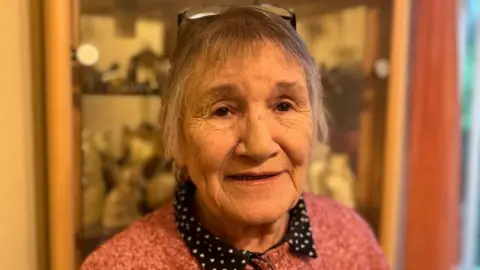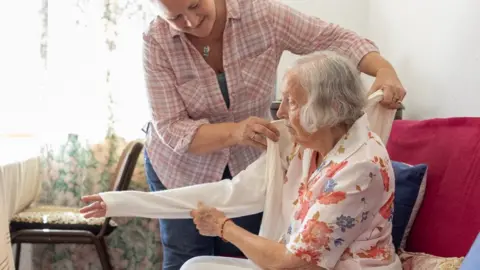Unpaid carers: Elderly woman in 'deep, dark hole' over lack of support
 BBC
BBCAn elderly woman has said she is in a "deep, dark hole" with her mental health due to a lack of respite support for unpaid carers.
Freda Carson, who is the primary carer for her 83-year-old husband, said she had not had a break in almost a year.
A new report from Carers NI suggested 48% of unpaid carers experienced symptoms of depression, while 79% said they often felt lonely.
It surveyed 1,024 unpaid carers across Northern Ireland.
The Belfast Health and Social Care Trust has apologised to anyone who had not been able to access respite care.
More than 220,000 people provide unpaid care for a sick or disabled family member or friend in Northern Ireland.
The census showed that about 2,600 of these were under 18.
Caring for people at home reduces pressure on the health and social care system including reducing the number of people in residential care and hospital.
Unpaid carers under pressure
Mrs Carson's husband lives with anxiety, depression and experiences psychosis.
She has been his primary carer for almost five years but said it was taking its toll on her own health.
"At first I was able to cope but this past year I have found it very difficult," she said.
 Getty Images
Getty Images"You have no freedom, you're isolated and you think nobody cares. It drags you down no matter how much you love that person. I'm exhausted.
"I have requested respite in the past but I'm told there is no support available.
"I feel like I am in a deep, dark hole with my mental health and no-one is listening."
Among the key findings of the survey were:
- 25% of carers described their mental health as bad or very bad
- 33% said they concern about waiting lists prevented them from seeking mental health support
- 30% said they spend more than 50 hours per week providing care
- 45% identified more breaks as one of their main needs as a carer
Craig Harrison from Carers NI said the "unrelenting pressure" of providing round-the-clock care was leading to "devastating levels of mental ill health" among carers.
"Depression, stress, anxiety and feelings of hopelessness are everyday realities for many local carers, and too often they're met with impenetrable barriers to accessing help when they need it," he said.
"We need to see action to cut long waiting lists for mental health services, improve awareness of the help available and deliver priority access to support for carers.
"Without these steps more and more people will get lost in the spiral of caring and mental ill-health, with terrible consequences for their wellbeing and quality of life."
A spokesperson for the Belfast Trust said it aimed to provide respite care in a range of settings, but that it was aware of the difficulties providing short breaks.
It said this was due to "challenges in accessing a care home placement because of limited bed capacity, particularly within the independent care home sector".
"Belfast Trust would like to sincerely apologise to everyone who has been unable to get timely access to respite services and we fully appreciate the anxiety this causes," the spokesperson added.
"We continue to work with our service users and their carers in an effort to find solutions to meet their needs."
